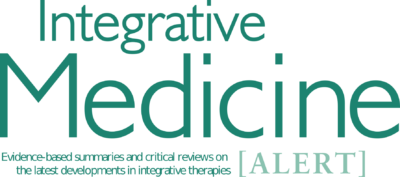
Integrative Medicine Alert – December 1, 2011
December 1, 2011
View Issues
-
A Review of the Clinical Effects of Green Tea: Up-to-date Reasons to Imbibe
We all know that we should be drinking more green tea; every few days, either the media or medical journals are touting a new use for the Asian staple. Can it really cure breast cancer while preventing liver disease, simultaneously increasing knee range of motion in people suffering from osteroarthritis? The answer is "possibly, yes," but an evidence-based review refines the glowing reports with some clinical pearls, dosing specifics, and hopeful avenues of future research, as detailed below. -
Tea Totaling: Green Tea and Cholesterol
A well-done meta-analysis showed that green tea, either as a beverage or as a supplement, could help lower total and LDL cholesterol levels in a statistically significant manner, but has no effect on HDL. The degree of clinical impact is debatable; what is not debatable is the poor quality of most studies on green tea and cholesterol. -
Further Research Warranted on Low-fat Diets with Fish Oil Supplementation for Prostate Cancer Patients
A prospective, randomized controlled trial measured the impact of a low-fat diet that included high levels of omega-3 fatty acids from fish oil on biomarkers for prostate cancer. No significant differences were found for the primary outcome during an interim analysis and the trial was stopped early. Analysis of secondary endpoints showed some significant differences between the groups, although other biomarkers did not differ. -
Vitamin E and Prostate Cancer
The SELECT Trial investigators report on nearly 10 years of follow-up of participants in a study of selenium and vitamin E and the risk of prostate cancer. A small but statistically significant increased risk of prostate cancer appears to be associated with taking vitamin E supplements. These results are in disagreement with others in the literature, and the authors present no plausible biological explanation for them. Nonetheless, the balance of evidence does not appear to support any recommendation that physicians advise their middle-aged and elderly patients to begin vitamin E supplementation for prostate cancer prevention. -
A Cool Head: Hypnosis and Hot Flashes
A randomized controlled trial of weekly clinical hypnosis sessions plus home self-hypnosis practice over 5 weeks for breast cancer survivors with hot flashes resulted in significant symptomatic improvement when compared to a matched group of women who received no additional treatment.
